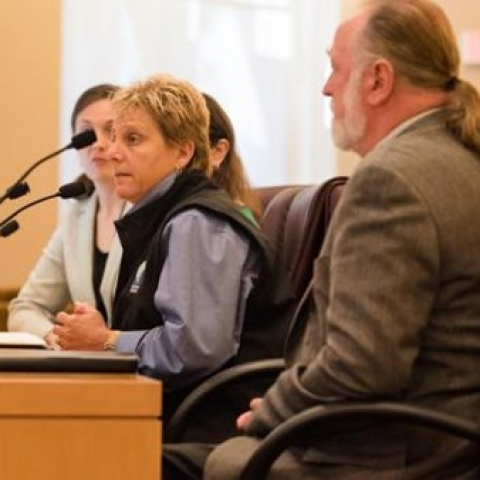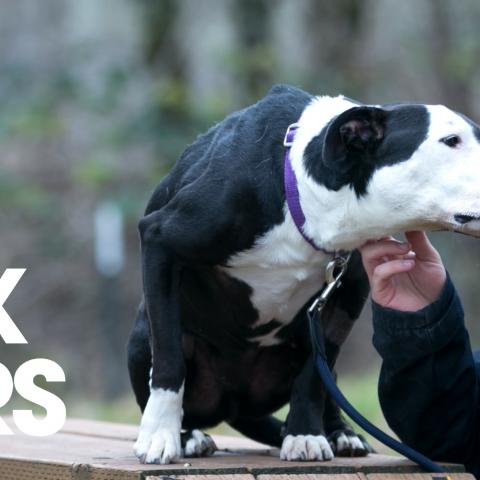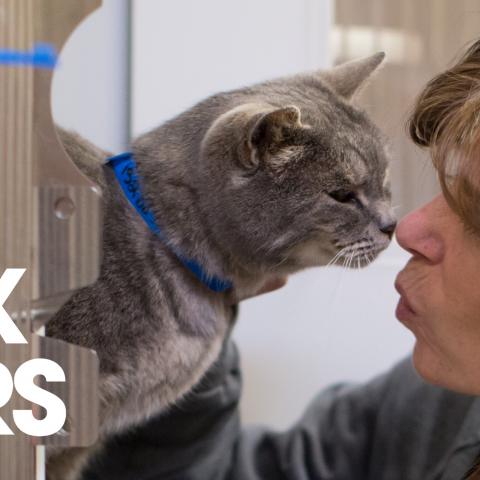Multnomah County Animal Services Responds to 2018 Audit Report
We welcome scrutiny of the county's work protecting the health, safety and welfare of people and pets. As the only public shelter in Multnomah County open to all, we're working to correct the challenges identified in two county audits. We've met—or are completing—79 percent of the auditor's 2016 recommendations. We know we have more work to do and are committed to doing so quickly and transparently. Learn more about the work of MCAS to provide adequate shelter staffing, and consistent enrichment to the animals in the form of social contact, mental stimulation, and physical activity.
The care of the animals and the community we serve is the most important service Multnomah County Animal Services provides. We appreciate the assistance of our auditor in assessing and reassessing our progress and need for improvement. It keeps us accountable and allows us to narrow in and address remaining issues.
Read the response from the Board of Commissioners
It’s important to note, this report does acknowledge the progress the shelter has made since the previous audit was completed in February 2016 including: significant improvements to the layout of the animal shelter, cooling units in the dog kennels, and new housing units for cats. The shelter has also obtained access to criminal background information for its Animal Control Officers. We added staff positions for a canine care specialist, feline care specialist, and two animal care technicians. Seventy-nine percent of the original issues identified by our auditor have been resolved or are currently being addressed by the division.
We work in partnership with our Auditor’s office and appreciate working closely to identify issues and improve our policies and practices. The people who work at MCAS are incredible. They work long, hard hours because they deeply care about what they do and want to provide the best services for this community. We will continue to work to provide a safe, comfortable place that cares for pets and reunites them with people despite budget, staffing and location constraints.
The details below provide more clarity on issues that have been remediated and future plans for the shelter.
The auditor noted four key areas of concern:
A lack of consistent animal enrichment that appeared related to staffing choices. This results in some animals receiving little to no human interaction or exercise, which can exacerbate existing behavior problems.
-
In the original audit in 2016, the auditors recommended the addition of four new animal care positions to assist with daily enrichment activities. In July 2017, the Board approved two new positions. These positions were used to create the Feline and Canine Care Specialist positions, which were critically needed to build the infrastructure to coordinate and implement daily enrichment activities.
-
Since the inception of these positions, the following improvements have been made:
-
Comprehensive behavioral assessment/evaluation process with color coding system that directly relates to enrichment activities
-
Development of enhanced volunteer animal handling program with corresponding color coding system.
-
Created and implemented our PAWS for Success Program, which focuses on enhancing enrichment, behavior modification, and information gathering for all animals in the shelter. This program is designed to improve internal communication between staff and volunteers regarding specific animals, better understanding of individual animal behaviors, individualized enrichment for each animal, and enhanced adoption services.
-
-
In regards to shelter staffing meeting 66 percent of nationally recognized standards for cleaning and feeding in FY17 - currently the shelter is staffed for 40 to 45 hours per day for animal care services. There is never a day that animals do not receive basic care which includes: feeding and cleaning. There are times when the shelter is over capacity and in accordance with the Association of Shelter Veterinarians standards, there are not enough staff per day. As noted below, two full-time animal care specialists will help improve this.
-
In regards to little or no human interaction, there are some animals who have limited contact due to their legal status, bite quarantine hold, or aggressive behavior.
-
We strive to have all dogs receive toys, kongs, or other enrichment tools on a daily basis that provide mental and physical stimulation.
-
All cats have scratching pads, hide-a-boxes and toys in their kennel and receive various other mental stimulation activities during the day (light balls, teaser wands, music).
Moving forward:
-
This is an area that we will continue to focus on and have recently been awarded a grant from the Lazin Animal Foundation to subsidize consultation services from Dogs Playing for Life to assist us in designing a more comprehensive enrichment and play group program. Dogs Playing For Life is a nationally recognized organization supporting the emotional well-being of sheltered animals.
-
Additionally, we will continue providing behavior and enrichment skills training to staff and volunteers and provide documentation for such training.
-
We plan to continue renovations to culminate in the installment of a new intake and adoption kennels by the end of the year. This will also allow for more space in our shelter and a healthier environment for animals.
-
In July, two full-time animal care aids joined our team to help in the care and enrichment of animals at the shelter. These position are funded through cost-saving measures undertaken by the department.
Barriers that make it difficult for people to be reunited with their pets.
-
MCAS is very proud of its average for return pets to owner (RTO) which is competitive with national standards, if not exceeding.
-
MCAS’ RTO (return to owner) rate for 2017 was 51% for dogs and 8% for cats. According to the American Society for the Prevention of Cruelty to Animals, the 2016 national return-to-owner rate is 26% for stray dogs, and 5% for stray cats.
-
-
The “barrier” indicated by the auditors is that some of the Found Reports on the MCAS Lost and Found site did not have pictures of the animals on the site. The report indicates that of the 178 reports reviewed, 47 or 25% did not have pictures. Of the 47 reported files without pictures, 23 of them had pictures uploaded within 6 hours of entry.
-
We strive to have all pictures uploaded within six (6) hours of admission. While we attempt to have pictures uploaded as quickly as possible, there are times that we cannot upload photos instantly upon admission. The process involves admitting the animal and gathering all of the information, taking the picture, and automatic upload from Shelter Buddy, our new data management system. Further, due to the multiple processes involved, there may be several staff members participating in this activity (ACO, Client Services and Animal Care).
-
It should also be noted that eight (8) or 16% of the cases the auditor mentioned as missing information were reclaimed the same day.
-
The County Ordinance requires 72 hours holding for unidentified stray animals. However, MCAS has chosen to extend this hold period for any day that we are not open to the public to help ensure reunification of all lost pets.
-
There were eight cases where animals were “transferred” early. The eight cases that were transferred early represent an error rate of 0.003% but we will continue to strive for a zero error rate.
-
In regards to the telephone waiting time: We acknowledge longer wait times have been an issue but one that has improved. In November, we made adjustments to the staffing patterns to address this concern. Since that time, we have been averaging less than a three (3) minute wait time. We will continue to track and monitor wait times each month.
Limited documentation about decisions to release animals with known behavioral problems. Staff were concerned the shelter had adopted out unsafe dogs.
-
Historically, minimal notes were entered into the animal record regarding behavior and/or reasons for euthanasia. However, this practice has changed in the past several months since the most recent audit was conducted. Additionally, we have new staff that are allowing us to address this issue. The current practice involves the following:
-
All behavioral documents are uploaded into the records in Shelter Buddy. Behavioral assessment documents are uploaded upon completion of the assessment, and other behavioral documents (Kennel Check-In, Behavior Modification Plans and Behavior Modification Session Reports) are uploaded when animals leave our care.
-
We are working with Shelter Buddy to create templates in the system, so that we can eliminate the paper/pen documents and immediately input data during the assessment.
-
Explanation of findings and reasoning for Shelter Review (a process to evaluate animals in need of medical or behavioral attention, or who may pose a risk to people, animals if placed in the community) sessions are entered into the general notes section of the record.
-
Through an established adoption interview process, animal services employees work with a potential adopter to make sure it is the right fit, this includes the animals history, temperament etc. If an animal is not the right fit, the adopter can return the pet.
-
Poor data tracking, including insufficient documentation of euthanized animals
-
The report indicates that there were a total of 11 cases out of 185 reviewed files that failed to have documentation in both the drug log and the animal record for the euthanasia of these animals. This represents a 5-percent error rate. We acknowledge this error and will continue to work with staff to ensure greater compliance in this area and meet a zero percent error rate.
-
The report also indicates that several people were issued multiple citation for the same issue. Upon reviewing the data, we found that the auditors had run a report from Shelter Buddy that indicated that multiple citations were issued to the same individual. The issue was a problem with the report generated by Shelter Buddy itself. The Shelter Buddy system showed duplicate citations. This reporting error has since been corrected.
Moving forward:
-
For the animals available for adoption, the kennel cards should reflect the current status. This issue will be addressed with staff for compliance.


